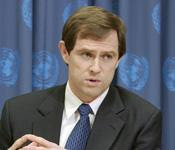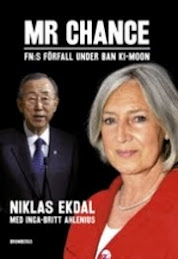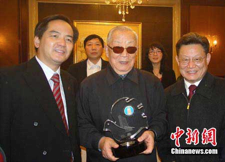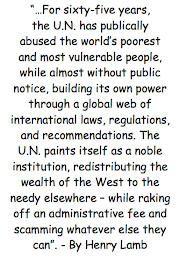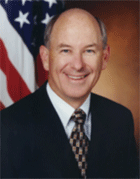
Friday 11 December 2009
UN Personnel Contracts return to normal - 5th Cmtt slap ban in the face ...yet again

Tuesday 8 December 2009
Audit report alleges corruption at U.N. weather agency
WMO Vote Rigging Scandal
The Associated Press
GENEVA: News allegations of corruption within the United Nations have surfaced in a confidential audit report that claims the 2003 election of the current chief of the U.N. weather agency was manipulated.
The report, obtained by The Associated Press on Friday, centered around payments to government delegates at the Geneva-based World Meteorological Organization, which coordinates the study of the world's weather and climate.
WMO hired Maria Veiga of Portugal, an independent auditor who wrote the report, in 2003 to investigate the financial irregularities, but fired her three years later for what it described as "serious misconduct."
The auditor, however, said she was blocked from pursuing her investigation, received intimidating phone calls and was threatened with legal action by one WMO official before being dismissed.
In a 65-page summary of her findings, Veiga said that Muhammad Hassan of Sudan, a former WMO staffer, skimmed some US$3 million from the agency while he was working in its training department.
The disappearance of the money was made public in 2003 when WMO handed the matter over to Swiss authorities. At the time Hassan, who by then had gone abroad, was suspected of having embezzled the money.
But according to the documents seen by the AP, most of the funds were allegedly used to influence the votes of about 50 WMO member states during the May 2003 election of the agency's new secretary-general.
The misappropriated funds were "used to pay travel, accommodation and pocket money of ... delegates of certain countries with WMO (on the understanding) that the delegates would then vote and act according to Mr. Hassan's and other WMO staff members' ... instructions," the report states.
Hassan's current whereabouts are unknown to Swiss authorities, and the AP was unable to contact him. But Marc Tappolet, the investigating magistrate of Geneva canton, told the AP that the Swiss inquiry against Hassan is continuing.
The purpose of the payments was to support the candidacy of Kenya's Evans Mukolwe, the report said. Veiga told the AP that delegates told her the idea was to draw votes away from France's official candidate, Jean Pierre Beysson, so that senior WMO official Michel Jarraud, also of France, could win the top post.
Mukolwe beat Beysson 85-70 in the first round of voting, but failed to win the required two-thirds majority in three subsequent rounds, and nominations were reopened. Lithuania then nominated Jarraud, who beat Mukolwe by 109 to 50 votes.
Jarraud had served for eight years as deputy to outgoing WMO chief Godwin Obasi of Nigeria.
"I think Mr. Obasi ... wanted his deputy to be elected because he felt that Mr. Jarraud's election would bring a certain continuity of his work," Beysson told the AP late on Friday by telephone from Paris.
Obasi, who allegedly had close ties to Hassan, has since returned to his native Nigeria. AP's calls to Obasi's phone numbers there went unanswered Saturday.
Jarraud said in a statement Saturday he was not involved in any wrongdoing.
"At no time did I attempt to influence the elections and I reject categorically any allegation in connection with this," he said.
WMO spokeswoman Carine Richard-van Maele said Veiga's allegations were "completely unfounded and defamatory." She added that the agency hoped the Swiss investigation would answer all questions in the case.
"WMO is convinced that the principle motive for the misappropriation of its funds was personal enrichment," Richard-van Maele said. "At no time did Mr. Jarraud have knowledge of fraudulent use of WMO funds. As soon as the fraud was discovered, Mr. Jarraud initiated action, as his top priority, to strengthen internal controls and procedures."
Veiga's report also mentions a dozen other high-level WMO staffers who were allegedly involved.
Her lawyer, Edward Flaherty, said the Swiss investigation into senior officials was blocked when Jarraud "refused to lift the immunity of the other persons of interest in the investigation."
The lifting of diplomatic immunity, which has so far occurred only in Hassan's case, is a precondition for a criminal investigation by national authorities against U.N. staff members.
___
Associated Press Writer Frank Jordans contributed to this report.
Saturday 5 December 2009
The essentials in Copenhagen

Rather than getting every small detail of a new global climate treaty done in Copenhagen, UN climate chief Yvo de Boer hopes the conference will reach agreements on four political essentials.
The wish for clarity is expressed by Yvo de Boer, executive secretary of the United Nations Framework Convention on Climate Change (UNFCCC), in an interview with Environment & Energy Publishing (E&E). According to Yvo de Boer, the four essentials calling for an international agreement in Copenhagen are:
1. How much are the industrialized countries willing to reduce their emissions of greenhouse gases?
2. How much are major developing countries such as China and India willing to do to limit the growth of their emissions?
3. How is the help needed by developing countries to engage in reducing their emissions and adapting to the impacts of climate change going to be financed?
4. How is that money going to be managed?
“If Copenhagen can deliver on those four points I’d be happy,” says Yvo de Boer.
He sees a need to get something signed and agreed in Copenhagen, but he thinks it will be very difficult to get every final, small detail of a whole new treaty done. The new climate treaty will be replacing the Kyoto Protocol which was adopted in Kyoto, Japan, in December 1997 and entered into force on 16 February 2005.
The Kyoto Protocol which sets binding targets for the reduction of greenhouse gas emissions has been signed and ratified by 184 parties of the UN Climate Convention. One notable exception is the United States, and Yvo de Boer is “really happy” to see the US back in the international climate change process and that the US is also engaging domestically in the process.
“My big lesson from the Kyoto era is that it's really important that the government delegation that represents the United States is in close touch with the Senate, with the elected officials on what's acceptable and what's not,” says de Boer, and he adds:
“I think that a major shortcoming of Kyoto was that the official delegation came back with a treaty they knew was never going to make it through the Senate. And this time I have the feeling that the communication is much stronger, that the Senate Foreign Relations Committee, through John Kerry, is really expressing strongly what they feel needs to be done in Copenhagen.”
Yvo de Boer thinks the Kyoto Protocol was rejected by the US for mainly two reasons. Firstly, because it did not involve action on the part of major developing countries. Secondly, because it was felt by the Bush administration that Kyoto would be harmful to the US economy.
Copenhagen will be a whole different scenario, and de Boer feels confident that President Barack Obama can successfully engage China and India and convince them to sign the next treaty.
“I think that Secretary of State Clinton's visit to Beijing was a really important and encouraging step to get us moving on that road,” says Yvo de Boer.
Asked about the global recession, de Boer thinks it will certainly have an impact on the negotiations in Copenhagen.
“You see already that investments in renewable energy projects are going down, partly because of the oil price going down and partly because of the economic activity going down,” he says.
But even though greenhouse gas emissions are expected to slow down as a result of shrinking industrial activities, de Boer does not believe it will lessen the pressure on countries to act and sign a new treaty.
“I get the impression talking to business people that they still want clarity from Copenhagen. If you're making investments now, for example in the energy sector, in power plants that are going to be around for the next 30 to 50 years, you can't really afford to keep waiting and waiting and waiting for governments to say where they're going to go on this issue.”
UN hits back at climate sceptics amid e-mails row
 The e-mails were posted on the internet last month |

TO READ ARTICLE ON BBC - CLICK HERE
The UN's official panel on climate change has hit back at sceptics' claims that the case for human influence on global warming has been exaggerated.
The Intergovernmental Panel on Climate Change (IPCC) said it was "firmly" standing by findings that a rise in the use of greenhouse gases was a factor.
It was responding to a row over the reliability of data from East Anglia University's Climatic Research Unit
Leaked e-mail exchanges prompted claims that data had been manipulated.
Last month, hundreds of messages between scientists at the unit and their peers around the world were put on the internet along with other documents.
Some observers alleged one of the e-mails suggested head of the unit Professor Phil Jones wanted certain papers excluded from the UN's next major assessment of climate science.
Professor Thomas Stocker and Professor Qin Dahe, IPCC |
Professor Jones, who denies this was his intention, has stood down from his post while an independent inquiry takes place.
In a statement, Professor Thomas Stocker and Professor Qin Dahe, co-chairmen of the IPCC's working group 1, condemned the act of posting the private e-mails on the internet, but avoided commenting on their content.
They went on to point to a key finding that states: "The warming in the climate system is unequivocal.
"[It] is based on measurements made by many independent institutions worldwide that demonstrate significant changes on land, in the atmosphere, the ocean and in the ice-covered areas of the Earth.
"Through further independent scientific work involving statistical methods and a range of different climate models, these changes have been detected as significant deviations from natural climate variability and have been attributed to the increase of greenhouse gases."
They added: "The body of evidence is the result of the careful and painstaking work of hundreds of scientists worldwide.
Gordon Brown, Prime Minister |
"The internal consistency from multiple lines of evidence strongly supports the work of the scientific community, including those individuals singled out in these e-mail exchanges."
The row comes ahead of the Copenhagen climate summit which starts on Monday.
Professor Jean-Pascal van Ypersele, vice-chairman of the IPCC, said it was no coincidence the information was released in the run-up to the summit.
He claimed unnamed conspirators could have paid for Russian hackers to break into the university computers to steal the e-mails.
He said the theft was a scandal and was "probably ordered" to disrupt the confidence negotiators have in the science.
Earlier, Climate Change Secretary Ed Miliband told the BBC he would be "very surprised" if there had been any wrongdoing on the part of the East Anglia University scientists.
"We're in a moment when the world is about to make some big political decisions," he said.
"And there will be people who don't want the world to make those big decisions and they are trying to use this in part to say somehow this is all in doubt and perhaps we should put the whole thing off.
"Well, I just think they're wrong about that."
Prime Minister Gordon Brown said the scientific evidence was "very clear" and called doubters a "flat Earth group".
He said: "There is an anti-change group. There is an anti-reform group. There is an anti-science group, there is a flat Earth group, if I may say so, over the scientific evidence for climate change."
'Open and transparent'
Meanwhile, the Met Office said it would publish all the data from weather stations worldwide, which it said proved climate change was caused by humans.
Its database is a main source of analysis for the IPCC.
It has written to 188 countries for permission to publish the material, dating back 160 years from more than 1,000 weather stations.
John Mitchell, head of climate science at the Met Office, said the evidence for man-made global warming was overwhelming - and the data would show that.
"So this is not an issue of whether we are confident or not in the figures for the trend in global warming, it's more about being open and transparent," he told the BBC.
The Met Office said it had already planned to publish the material long before the row and denied reports that government ministers had tried to block the publication.
THE ECONOMIST: - Climate change e-mails - REPLAY ALL
TO READ ARTICLE ON THE ECONOMIST - CLICK HERE
A row over climate change e-mails grows louder

AS POLITICIANS, policy wonks, businessmen, NGO types, hacks and hangers-on converge in Copenhagen for the forthcoming climate conference, a row over a set of e-mails from a previously obscure part of Britain's University of East Anglia is becoming ever louder, if no more illuminating. Two weeks ago e-mails and other documents that had been leaked or hacked from the university's Climatic Research Unit (CRU) were sent to various websites. Those with a longstanding opposition to action on climate change, from bloggers to members of the American Senate to the Saudi government, are touting the e-mails as a resource with which to derail the Copenhagen talks.
CRU's researchers use various techniques to reconstruct the temperatures of times past. Some of the reconstructions they have been party to have long been the subject of technical criticism, sometimes in peer-reviewed literature, more frequently on blogs, notably Climate Audit, an award-winning blog by Stephen McIntyre. The critics have made many attempts to get CRU to distribute the raw data and computer codes which its scientists work on. The e-mails and other documents read as though the researchers were obstructive in dealing with some of these requests, that some of the data they used were in poor shape, that they may have indulged in spin when presenting some results and that they really did not care for their critics.
The head of the CRU, Phil Jones, has stepped aside while the university undertakes an enquiry apparently centred on how the files got out and on how they relate to freedom of information requests. On Friday December 4th Rajendra Pachauri, chair of the Intergovernmental Panel on Climate Change, said that the organisation would also hold some sort of an inquiry, perhaps looking at the scientific substance of the issues and the scientists' approach to the IPCC.
The IPCC bases its work on papers that have been published in the peer-reviewed scientific literature. In one e-mail Mr Jones talks of stopping a couple of papers that he holds in low esteem from being discussed in an IPCC report “even if we have to redefine what the peer-review literature is”. This does not look good, though it is worth noting that at least one of those papers was, in fact, included in the report. Other e-mails talk of trying to get editors at specific journals removed.
That the e-mails and documents should be inspected in some sort of systematic way for evidence of poor practice or even chicanery is a fair next step. But it is ludicrous to think that climate science is a house of cards that will collapse if the e-mails were to discredit CRU's work.
Carbon dioxide is a greenhouse gas. It warms the surface and increases the amount of water vapour that the atmosphere can hold, which in turn warms things further. How much warming you get for a given amount of carbon dioxide is hard to say, because there are feedback processes involved, such as the making of clouds, and also other factors at work. It may be that this century's warming will be moderate, staying below 2ºC. It is quite possible, though, that unless something is done the warming will be greater, and there is a real risk that it could be a lot greater, perhaps 4ºC or more.
The inquiries into the “climategate” e-mails and files may find that some of the researchers fell short of the standards of their calling, or that some of the science in question does not stand up as well as its authors would wish. To think that all action on climate change should cease pending such inquiries, though, is foolish, cynical or both.
Climategate reveals 'the most influential tree in the world'
CLICK HERE TO READ STORY ON TELEGRAPH.CO.UK
Leaked emails from the Climatic Research Unit show how the world's weightiest climate data has been distorted, says Christopher Booker
Published: 7:41PM GMT 05 Dec 2009

Coming to light in recent days has been one of the most extraordinary scientific detective stories of our time, bizarrely centred on a single tree in Siberia dubbed "the most influential tree in the world". On this astonishing tale, it is no exaggeration to say, could hang in considerable part the future shape of our civilisation. Right at the heart of the sound and fury of "Climategate" – the emails leaked from the Climatic Research Unit (CRU) in East Anglia – is one story of scientific chicanery, overlooked by the media, whose implications dwarf all the rest. If all those thousands of emails and other documents were leaked by an angry whistle-blower, as now seems likely, it was this story more than any other that he or she wanted the world to see.
To appreciate its significance, as I observed last week, it is first necessary to understand that the people these incriminating documents relate to are not just any group of scientists. Professor Philip Jones of the CRU, his colleague Dr Keith Briffa, the US computer modeller Dr Michael Mann, of "hockey stick" fame, and several more make up a tightly-knit group who have been right at the centre of the last two reports of the UN's Intergovernmental Panel on Climate Change (IPCC). On their account, as we shall see at this week's Copenhagen conference, the world faces by far the largest bill proposed by any group of politicians in history, amounting to many trillions of dollars.
It is therefore vitally important that we should trust the methods by which these men have made their case. The supreme prize that they have been working for so long has been to establish that the world is warmer today than ever before in recorded history. To do this it has been necessary to eliminate a wealth of evidence that the world 1,000 years ago was, for entirely natural reasons, warmer than today (the so-called Medieval Warm Period).
The most celebrated attempt to demonstrate this was the "hockey stick" graph produced by Dr Mann in 1999, which instantly became the chief icon of the IPCC and the global warming lobby all over the world. But in 2003 a Canadian statistician, Steve McIntyre, with his colleague Professor Ross McKitrick, showed how the graph had been fabricated by a computer model that produced "hockey stick" graphs whatever random data were fed into it. A wholly unrepresentative sample of tree rings from bristlecone pines in the western USA had been made to stand as "proxies" to show that there was no Medieval Warm Period, and that late 20th-century temperatures had soared to unprecedented levels.
Although McIntyre's exposure of the "hockey stick" was upheld in 2006 by two expert panels commissioned by the US Congress, the small group of scientists at the top of the IPCC brushed this aside by pointing at a hugely influential series of graphs originating from the CRU, from Jones and Briffa. These appeared to confirm the rewriting of climate history in the "hockey stick", by using quite different tree ring data from Siberia. Briffa was put in charge of the key chapter of the IPCC's fourth report, in 2007, which dismissed all McIntyre's criticisms.
At the forefront of those who found suspicious the graphs based on tree rings from the Yamal peninsula in Siberia was McIntyre himself, not least because for years the CRU refused to disclose the data used to construct them. This breached a basic rule of scientific procedure. But last summer the Royal Society insisted on the rule being obeyed, and two months ago Briffa accordingly published on his website some of the data McIntyre had been after.
This was startling enough, as McIntyre demonstrated in an explosive series of posts on his Climate Audit blog, because it showed that the CRU studies were based on cherry-picking hundreds of Siberian samples only to leave those that showed the picture that was wanted. Other studies based on similar data had clearly shown the Medieval Warm Period as hotter than today. Indeed only the evidence from one tree, YADO61, seemed to show a "hockey stick" pattern, and it was this, in light of the extraordinary reverence given to the CRU's studies, which led McIntyre to dub it "the most influential tree in the world".
But more dramatic still has been the new evidence from the CRU's leaked documents, showing just how the evidence was finally rigged. The most quoted remark in those emails has been one from Prof Jones in 1999, reporting that he had used "Mike [Mann]'s Nature trick of adding in the real temps" to "Keith's" graph, in order to "hide the decline". Invariably this has been quoted out of context. Its true significance, we can now see, is that what they intended to hide was the awkward fact that, apart from that one tree, the Yamal data showed temperatures not having risen in the late 20th century but declining. What Jones suggested, emulating Mann's procedure for the "hockey stick" (originally published in Nature), was that tree-ring data after 1960 should be eliminated, and substituted – without explanation – with a line based on the quite different data of measured global temperatures, to convey that temperatures after 1960 had shot up.
A further devastating blow has now been dealt to the CRU graphs by an expert contributor to McIntyre's Climate Audit, known only as "Lucy Skywalker". She has cross-checked with the actual temperature records for that part of Siberia, showing that in the past 50 years temperatures have not risen at all. (For further details see the science blog Watts Up With That.)
In other words, what has become arguably the most influential set of evidence used to support the case that the world faces unprecedented global warming, developed, copied and promoted hundreds of times, has now been as definitively kicked into touch as was Mann's "hockey stick" before it. Yet it is on a blind acceptance of this kind of evidence that 16,500 politicians, officials, scientists and environmental activists will be gathering in Copenhagen to discuss measures which, if adopted, would require us all in the West to cut back on our carbon dioxide emissions by anything up to 80 per cent, utterly transforming the world economy.
Little of this extraordinary story been reported by the BBC or most of our mass-media, so possessed by groupthink that they are unable to see the mountain of evidence now staring them in the face. Not for nothing was Copenhagen the city in which Hans Andersen wrote his story about the Emperor whose people were brainwashed into believing that he was wearing a beautiful suit of clothes. But today there are a great many more than just one little boy ready to point out that this particular Emperor is wearing nothing at all.
I will only add two footnotes to this real-life new version of the old story. One is that, as we can see from the CRU's website, the largest single source of funding for all its projects has been the European Union, which at Copenhagen will be more insistent than anyone that the world should sign up to what amounts to the most costly economic suicide note in history.
The other is that the ugly, drum-like concrete building at the University of East Anglia which houses the CRU is named after its founder, the late Hubert Lamb, the doyen of historical climate experts. It was Professor Lamb whose most famous contribution to climatology was his documenting and naming of what he called the Medieval Warm Epoch, that glaring contradiction of modern global warming theory which his successors have devoted untold efforts to demolishing. If only they had looked at the evidence of those Siberian trees in the spirit of true science, they might have told us that all their efforts to show otherwise were in vain, and that their very much more distinguished predecessor was right after all
Friday 4 December 2009
Al Gore’s Crumbling Credibility Cracked By Climategate

“Super cereal” carbon billionaire has about as much integrity left as his South Park caricature
Steve Watson,
Infowars.net
Friday, Dec 4, 2009
It has not been a good month for Al Gore. If I wanted to enter an understatement of the year contest I’m pretty sure that one would win.
Citing “unforeseen circumstances”, Gore has been forced to cancel an event in Copenhagen that he was due to speak at ahead of the climate change talks next week.
Ticket holders who had paid up to $1200 each for the event, ironically titled “Climate Conclusion”, will be forced to seek refunds.
The circumstances that have forced Gore to keep a low profile are almost certainly related to the climategate scandal, which is now the most viral topic on the internet.
Research presented here by Richard North shows that the ratio between the number of general web pages on Google and the number of news reports recorded puts climategate way in front of Afghanistan, Tiger Woods and Obama in terms of general interest.
It is also no coincidence that Gore has been confronted on several occasions in the past few days.
From Portland to Chicago, almost everywhere Gore has made a public appearance lately, he has been booed, protested and challenged by alert Americans who are refusing to go along with his fearmongering assertions:
Climategate: the UN investigation will be a whitewash
TO READ ARTICLE ON TELEGRAPH.CO.UK (CLICK HERE)
It is rather ironic that the United Nations, a world body that has done more to push the global warming agenda that any other organization, is now vowing to investigate the leaked Climategate emails. Rajendra Pachauri, the chairman of the UN’s Intergovernmental Panel on Climate Change (IPCC), told BBC Radio 4:
We will certainly go into the whole lot and then we will take a position on it. We certainly don’t want to brush anything under the carpet. This is a serious issue and we will look into it in detail.
Forgive my scepticism over this, but the United Nations happens to be one of the most inefficient, corruption-riddled, unaccountable and untransparent entities on the face of the earth. It is hard to see how the UN is going to conduct this kind of inquiry with a straight face, let alone an ounce of credibility. I spent several years working on UN issues in Washington, and served as an expert on the Gingrich-Mitchell Congressional mandated Task Force on the United Nations, and nothing I have seen of the UN convinces me that it is capable of carrying out a remotely objective investigation.
And who is the man in charge of the United Nations whitewash/inquiry? Rajendra Pachauri is one of the world’s biggest prophets of climate change doom, which he argues is “the greatest challenge facing humanity.” Last year he shared the Nobel Peace Prize on behalf of the IPCC with Al Gore. Like his colleague Lord Stern, Pachauri ludicrously believes that people should eat less meat to curb carbon emissions.
We don’t need a fake UN panel on Climategate. What is needed is a full Senate investigation as well as Parliamentary inquiry into a massive scandal with major implications for both the US and the UK and their future approach to the global warming issue. And if Congressional hearings are held, who better to have leading the charge on Capitol Hill than the brilliant James Delingpole, who deserves huge credit for almost single-handedly bringing the Climategate débacle to the attention of the American public.
Copenhagen Conference Has Massive Carbon Footprint
| FRIDAY, 04 DECEMBER 2009 14:21 |
The upcoming UN Climate Change conference is going to have a carbon "footprint" that would not fit in a pair of snowshoes, and the delegates’ alleged contribution to global warming will not be limited to the political hot air of their speechifying. The U.N. estimates the 12-day conference will create 40,584 tons of carbon dioxide equivalents, roughly the same amount as the carbon emissions of Morocco in 2006. Those greenhouse gas emissions are comprised of two parts: international travel and local emissions from hotels and transportation venues. Organizers will also reportedly lay 900 kilometers of computer cable and 50,000 square miles of carpet, along with more than 200,000 meals to be served and 200,000 cups of coffee. The one bright spot is that the announcement that former Vice President Al Gore will not be delivering one of his soporific speeches at Copenhagen may result in a statistically significant reduction in the amount of coffee consumed by delegates striving to remain awake. 1. How much are the industrialized countries willing to reduce their emissions of greenhouse gases? 2. How much are major developing countries such as China and India willing to do to limit the growth of their emissions? 3. How is the help needed by developing countries to engage in reducing their emissions and adapting to the impacts of climate change going to be financed? 4. How is that money going to be managed? In short, while delegates whose raison d’être for gathering in the first place has been subjected to justified public ridicule, nothing will have changed concerning the fundamental policy goals that will be set forth before the world. President Obama will travel to the Danish capital on Dec. 9 to offer his goal of cutting emissions 17 percent by 2020, in line with a bill passed by the House in June and slightly less than a 20-percent decrease proposed in the Senate. “The president going to Copenhagen will give positive momentum to the negotiations,” Michael Froman, Obama’s deputy national security adviser for international economies, told reporters last month. “We think it will enhance prospects for success.” Joined by up to seven cabinet members, Obama will also propose reducing emissions by 83 percent by 2050 and a 30 percent reduction in 2005 levels by 2025. China and India have said industrialized countries like the United States — the biggest greenhouse gas producer among developed nations — must be willing to slash carbon output 40 percent by 2020 from 1990 levels if it expects poorer economies to agree to long-term goals. Such reductions can only be accomplished at a very great cost. That the rationale for enduring such costs has been undermined, if not eliminated entirely, why proceed? In part because the political elites cannot endure looking foolish, and in part because it is the environmental excuse for the agenda for a radical economic redistribution that will be pushed at Copenhagen, which has been about power and social engineering all along. In advancing their agenda, the internationalists can justify anything — even the pollution they produce while "saving the Earth from pollution." |
Don't let ‘Climategate' melt down your portfolio


Published on Friday, Dec. 04, 2009 7:14PM ESTLast updated on Friday, Dec. 04, 2009 7:33PM EST
I've said before that you are more vulnerable to skillful rhetoric than you think. Well, the past week proved it.
You've probably read about “Climategate” – how thousands of hacked e-mails from climate scientists revealed that they colluded to fudge their conclusions about global warming, told each other to destroy incriminating e-mails and perhaps even dumped raw data to mask the fraud.
Why did it work? Because the falsified conclusions appealed to people's good nature, and because the conspirators co-opted above-average rhetoricians to deliver their message.
Now why am I going on about this? For two reasons: First, because global warming is an investment theme that a few brokers are pushing; so, if you are a theme investor, be careful. Second, this sort of revelation is a perfect teaching moment of the madness of crowds.
Similar irrational manias included global cooling in the 1970s (when investors were urged to invest in thermal insulation, and the like); the Club of Rome's fear that we're running out of resources; the Internet dot-com bubble, when insane stock prices for companies without revenues were the norm; and others of the same ilk: mass hysterias that allowed a few media-savvy promoters to take the money of the many, by preying on their credulity, their emotions or both. Like global warming now.
If you think that calling global warming an irrational mania is a bit harsh, consider this: Say that a pharmaceutical company's researchers were caught fudging their tests to make their drug look effective; then, when found out, conveniently lost the non-fudged data. If a doctor prescribed for your child the fraudsters' drug, would you let her take it? If you said yes, would we not be justified in saying you are acting irrationally?
This, in effect, is what's happening now: global warming has become a near-religious test of civic virtue, just as being invested in Internet stocks became a test of investment savvy in 2000. Which is why many investors dazedly held on to Nortel all the way down to zero, even after its accounting issues had been revealed. And now, even though you can't trust the climate change data, the Copenhagen conference still goes on and promoters including Al Gore are out begging the public to give the scientists the benefit of the doubt. This is the same Mr. Gore who is profiting from tax credit-based environmental investments.
Do you still wonder why I see elements of mass madness here?
If there's a key lesson here for you, it's this: learn to resist the lure of popular fads, whether market-related, or ideology-based. If you don't, you're likely to find yourself investing in the next Nortel, Bre-X, or Madoff fund, or windmills supported by tax credits.
Oh, yes, tax credits. If there's one area to watch out for, it's a virtuous industry needing tax credits to make it viable. In the 1960s, the Club of Rome concluded (based on some other dodgy data) that the world was running out of resources. So, the Canadian government gave inventory tax credits to mining companies. The result was overproduction, bankruptcies and low resource prices for years. There was a similar panic about oil in the '70s, so huge tax breaks were offered for drilling the polar icecaps. The drillers went bust, as did some RRSPs for the credulous who fell for it.
Honest scientists can fall prey to manias, too – especially investment scientists. Remember modern portfolio theory? It, too, was a popular mass-mania that came replete with math and famous professors, who got Nobel prizes for the silly notion that risk is equivalent to the squiggliness of a line, not ignorance of the fundamentals. This theory ushered in derivatives and the Basel I and II banking rules, which helped undermine the global banking system.
How could you know that modern portfolio theory was a popular mania, and that its science was bunk? Why, Warren Buffett warned you for years. The main supporters were professors and derivatives salesmen – all of whom, like Al Gore (another Nobelist), benefited from the foolishness, while the masses lost.
So how can you ensure you're not harmed in future by slick rhetoric? First, by forcing yourself to admit, when the first signs of fraud appear, that you have been duped. Don't let your pride stand in the way. Get out. This way, you avoid staying on to the grim end with future Nortels.
Second, whenever you see a talking head pushing a stock or a fashionable disaster on TV, ask yourself: “Who pays him?” Everyone in the market is talking up his book, yet once a mania starts, everyone has the same book, and so they all push the same thing higher until it all unravels.
How close are we to the unravelling of the global warming fad? I think it has started.
There are already calls in the United States and Britain for probes into Climategate, and dragging out all the lies and airing them in public will be the end of global warming.
So don't get stuck with investments tied to it, either directly, or via tax credits.
Al Gore Cancels $1,200 Per Handshake Event In Copenhagen
Do the "unforeseen changes" have anything to do with the unforeseen changes in climate change evidence?
READ ARTICLE ON WALL STREET JOURNAL (CLICK HERE)
The Media Research Center
Al Gore apparently has canceled a high-priced speaking engagement during the upcoming climate change conference in Copenhagen.
As NewsBusters reported Tuesday, the Nobel Laureate was slated to lecture about his new book "Our Choice" where attendees could pay over $1,200 a ticket for the right to meet the Global Warmingist-in-Chief and have their picture taken with him.
According to Danish newspaper Berlingske, this has been canceled due to "unforeseen changes" to Gore's schedule (rough translation follows, h/t Marc Morano):
Al Gore has this morning told Berlingske Media's great annoyance has canceled his planned major climate talks for Danes 16th December 1 Tap in the old Carlsberg because, under the title "Climate Conclusion".
Cancellation comes with regard to unforeseen changes in Al Gore's program for the climate summit, COP 15. [...]
Around 3000 the Danes had already secured a ticket for Berlingske Media's event, planned since August and should have taken place just two days before the climate summit, COP 15, will end. [...]
We have had a clear-cut agreement, and it is unusual with great disappointment that we have to announce that Al Gore cancels.
From what NewsBusters can tell, this is the $1,200 per handshake lecture. Unfortunately, the link advertising this event at VisitCopenhagen.com now goes to a page claiming "This page cannot be found."
However, the cached version disclosed:
The lecture with Al Gore is on 16 December 2009 in one of the old bottling halls, Tap 1, at Carlsberg Brewery. Tap 1 is a new venue for concerts, lectures and exhibitions in Copenhagen's new developing area of Carlsberg's old brewery site.
Obviously, this is the same event that Berlingske claims has been canceled.
Makes one wonder why VisitCopenhagen.com chose to scrub this event completely from its website rather than inform folks it's been canceled.
Exit question: Do the "unforeseen changes" to Gore's schedule have something to do with ClimateGate and/or the fee being charged for his handshake?
Stay tuned.



 The veracity of proponents of the theory of man-made climate change is very much in doubt in the days leading up to the UN conference in Copenhagen. However, one thing that will be proven beyond a doubt in the next several weeks is that not all pollution is created equal: Some pollution is apparently sanctified by the context of its generation.
The veracity of proponents of the theory of man-made climate change is very much in doubt in the days leading up to the UN conference in Copenhagen. However, one thing that will be proven beyond a doubt in the next several weeks is that not all pollution is created equal: Some pollution is apparently sanctified by the context of its generation.